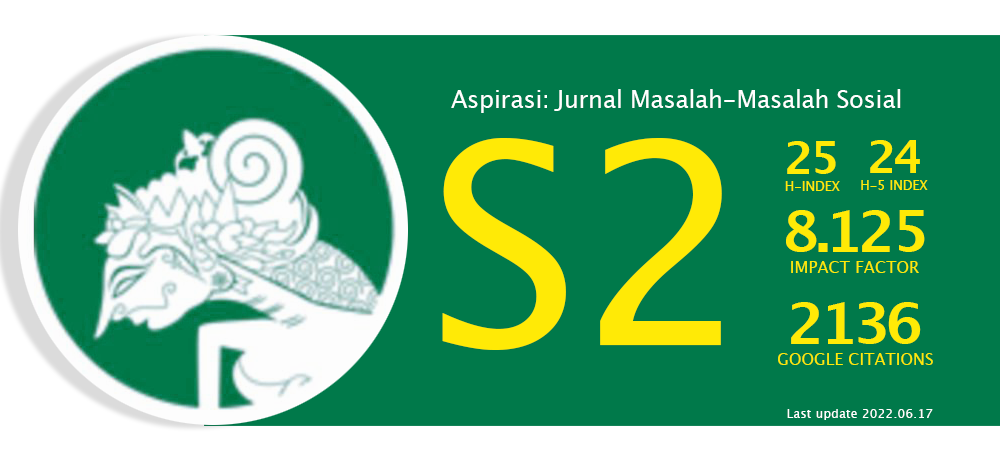Strategi Dosen dalam Pengondisian Perilaku Membaca Mahasiswa di Era Digital: Studi Kasus di Kalimantan Barat dan Sulawesi Selatan
Abstract
Reading is an activity that helps develop college student’s thinking ability, as well as support academic performance and achievement. This study wanted to know how the role of lecturers in shaping student’s reading behavior in the digital era. By interviewing 26 lecturers, 38 students, 2 university library heads and an officer of provincial education authorities, this study found that students' reading behavior did not grow due to lack of guidance in the previous education level. Interaction with information technology and telecommunications in the digital era increasingly keeps students away from the expected reading behavior. Intervention of the lecturer becomes important in conditioning the reading behavior, that is with the assignment of notes and the assignment of reading. In addition, universities need to prepare facilities and infrastructures that support the growth of student’s reading behavior.
Membaca adalah kegiatan yang membantu mengembangkan pemikiran mahasiswa sehingga mendukung performa dan pencapaian akademik. Penelitian ini ingin mengetahui bagaimana peran dosen dalam membentuk perilaku membaca mahasiswa di era digital. Dengan mewawancarai 26 dosen, 38 mahasiswa, 2 pimpinan perpustakaan kampus, dan 1 pejabat dinas pendidikan provinsi, peneliti menemukan bahwa perilaku membaca mahasiswa tidak tumbuh karena kurangnya pembinaan di jenjang pendidikan sebelumnya. Interaksi dengan teknologi informasi dan telekomunikasi di era digital semakin menjauhkan mahasiswa dari perilaku membaca yang diharapkan. Intervensi dari dosen menjadi penting dalam mengondisikan perilaku membaca, yaitu dengan penugasan mencatat dan penugasan membaca. Selain itu, perguruan tinggi perlu mempersiapkan sarana dan prasarana yang mendukung tumbuhnya perilaku membaca mahasiswa.
Keywords
Full Text:
pdfReferences
Jurnal
Amiama-Espaillat, C. & Mayor-Ruiz, C. 2017. Digital Reading and Reading Competence: The Influence in the Z Generation from the Dominican Republic. Comunicar, (English, Ed.; Huelva).25.52,2017,
hlm. 105-113).
Burgess, M. L., Price, D. P., & Caverly, D. C. 2012. Digital Literacies in Multiuser Virtual Environments Among College-Level Developmental Readers. Journal of College Reading and Learning, 43(1), hlm. 13-30.
Cassidy, S. 2004. Learning Styles: An Overview of Theories, Models, and Measure. Educational Psychology, Vol. 24, No.4.
Davidovitch, N., Yavich, R., & Druckman, E. 2016. Don’t Throw Out Paper and Pens Yet: on the Reading Habits of Students. Journal of International Education Research, 12(4), hlm. 129-144.
Fernández-Cruz, F.J., & Fernández-Díaz, M.J. 2016. Los Docentes de la Generación Z y sus Competencias Digitales [Generation Z ́s Teachers and their Digital Skills]. Comunicar, 46 (XXII).
Gordon, S. 2010. Once You Get Them, How Do You Keep Them? Millennial Librarians at Work. New Library World, 111(9), hlm. 391-398.
Grigoryan, T., & Babayan, N. 2015. Digital Natives and Digital Immigrants in A Paperless Classroom. International Journal of Arts & Sciences, 8(1), hlm. 289-296.
Guzmán, L.,Alfonso Arg. 2012. University students’ digital Reading and Writing Migration. Rusc, 9(1), hlm. 200-216.
Hillesund, T. 2007. Reading Books in the Digital Age Subsequent to Amazon, Google and the Long Tail. First Monday, 12(9).
Hoeft, Mary E. 2012. Why University Students Don’t Read: What Professors Can Do to Increase Compliance. International Journal for the Scholarship of Teaching and Learning Vol.6, No. 2.
Katz, I., Assor, A., Kanat-maymon, Y., & Bereby-meyer, Y. 2006. Interest as a Motivational Resource: Feedback and Gender Matter, but Interest Makes the Difference. Social Psychology of Education: An International Journal, 9(1), hlm. 27-42.
Leu, Donald J, et al. 2011. The New Literacies of Online Reading Comprehension: Expanding the Literacy and Learning Curriculum. Journal of Adolescent & Adult Literacy, 55(1), hlm. 5–14.
Leu, Donald J. Forzani, Elena., Rhoads,Chris., Maykel, Cheryl., Kennedy, Clint & Timbrell, Nicole. 2014. The New Literacies of Online Research and Comprehension: Rethinking the Reading Achievement
Gap. Reading Research Quarterly, 0(0), hlm. 1–23.
Lih-Juan, ChanLin. 2013. Reading Strategy and the Need
of E-Book Features. The Electronic Library, 31(3), 329-344.
McGeown, Sarah, P.et al. 2015. Exploring the Relationship between Adolescent’s Reading Skills, Reading Motivation and Reading Habits, Read Write 28, hlm. 545–569.
Mcginn, N. F., & Schiefelbein, E. 2015. Getting Students To Read Before Class: Innovation In A University In Chile. Prospects, 45(4), hlm. 447-464.
Millares, M. D. 2012. Attention Span. The American Music Teacher, 61(5), 20-24.
Mutlu Bayraktar, D., & Altun, A. 2014. The Effect of Multimedia Design Types on Learners’ Recall Performances with Varying Short Term Memory Spans. Multimedia Tools and Applications, 71(3), hlm. 1201-1213.
Nor Shahriza, A. K., & Hasan, A. 2007. Reading Habits and Attitude in the Digital Age. The Electronic Library, 25(3), 285-298.
Wigfield, A., Guthrie, John T., & McGough, K. 1996. A Questionnaire Measure of Children’s Motivations for Reading. National Reading Research Center Universities of Georgia and Maryland Instructional Resource, No. 22 Spring 1996.
Buku
Anwar, Chairul. 2017. Buku Terlengkap Teori-Teori Pendidikan Klasik Hingga Kontemporer. Yogyakarta: IRCiSoD.
Carr, Nicholas. 2011. The Shallows. Bandung: PT Mizan Pustaka.
Cortina, Joe & Elder, Janet. 2005. Opening Doors: Understanding College Reading (4th Edition). New York: McGraw-Hill.
Rakhmat, Jalaluddin. 2008. Psikologi Komunikasi. Bandung: PT. Remaja Rosdakarya.
Subkhan, Edi. 2016. Pendidikan Kritis: Kritik atas Praksis Neoliberasi dan Standardisasi Pendidikan. Yogyakarta: Ar-Ruzz Media.
Laporan
Asosiasi Penyelenggara Jasa Internet Indonesia. 2016. Infografis Penetrasi & Perilaku Pengguna Internet Indonesia: Survey 2016.
Majalah
Nelson, Jennifer L. 2015. Teaching in the #AgeofLiteracy, Literacy Today, July/August 2015, Vol 33, Issue 1,hal 18-21.
DOI: https://doi.org/10.46807/aspirasi.v8i2.1265
Refbacks
- There are currently no refbacks.







